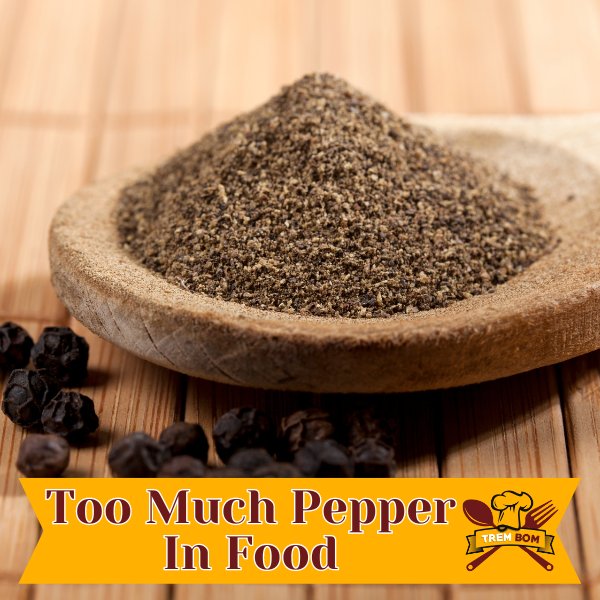
Have you ever found yourself in a situation where you’ve added too much pepper to your dish, resulting in an overpowering taste? Don’t worry; we’ve all been there. Too much pepper in food can make even the most mouth-watering recipes inedible.
But fret not, because in this article, we will share quick and easy tips to help you fix the problem of too much pepper in your food. Whether you’ve accidentally added an excessive amount of pepper or if the flavor is overpowering, we have solutions to help you balance the seasoning and save your meal. So, let’s jump right in!
Key Takeaways:
- Too much pepper in food can be fixed with the right techniques and ingredients.
- Assessing the pepper intensity is crucial before taking measures to reduce its overpowering taste.
- Neutralizing the spice with other ingredients, dilution with broth or liquid, adding cream or dairy products, utilizing acidic ingredients, cooking techniques to subdue pepper, and blending with other flavors are some effective ways to manage excessive pepper in your dish.
- Adjusting in progress and tasting as you go can prevent the pepper from overpowering the entire recipe.
- Experimenting with various methods can help you find the best approach for your taste preferences.
Understanding the Impact of Pepper
Pepper is a beloved spice that adds a unique zest to meals, but it’s easy to go overboard with it. Having too much pepper in your food can cause an overpowering taste that can ruin the dish. However, the good news is you can manage the quantity of pepper when cooking to reduce the flavor without sacrificing the essence that it brings to your food.
Reducing the pepper flavor is essential to balance the taste and create a harmonious blend of flavors in your dishes. Pepper can impact all the other ingredients in your recipe, so it’s crucial to assess and manage the intensity of the spice. Too much pepper can quickly ruin a recipe that you’ve put hard work into crafting.
Before we jump into the various pepper management techniques, let’s understand the impact of pepper and its excessive use. The result of overwhelming pepper can be reduced through techniques that won’t compromise the quality of the meal, making it simple to fix this issue by following our tips on managing pepper in cooking.
Assessing the Pepper Intensity
Dealing with excessive spice in recipes can be challenging. When it comes to pepper, it’s crucial to assess the intensity of the spice. Here are some methods to help you evaluate the pepper level in your dish:
- Take a small sample bite to assess the level of spiciness you are dealing with.
- Compare the taste of your dish to the desired level of spiciness. Determine the difference in flavor and how much pepper should be reduced.
- Have someone else taste your dish. A second opinion can help you identify if the pepper flavor is overpowering.
By following these steps, you can determine the appropriate amount of pepper to reduce the overpowering spice and gain control over how to manage pepper quantity in cooking.
Neutralizing the Spice with Other Ingredients
If you’ve accidentally added too much pepper or if the flavor is overpowering, don’t worry. There are various options to balance the seasoning in your food and reduce the pepper’s intensity.
One effective way to manage the excessive pepper taste is by neutralizing it with other ingredients. Here are some tips to help tone down the pepper’s intensity:
| Ingredient | Explanation |
|---|---|
| Vinegar | The acidity of vinegar can help reduce the pepper’s heat and enhance the flavor of the dish. |
| Sugar or honey | Sweeteners can help balance the spiciness and create a more pleasant taste. |
| Coconut milk | Coconut milk can help mellow down the pepper flavor and provide a creamy texture to the dish. |
| Lemon or lime juice | The tartness of citrus fruits can help balance the taste and create a refreshing flavor. |
| Bread or starches | Adding bread or starches can help soak up the excess pepper and balance the taste. |
By incorporating these ingredients, you can create a more balanced and enjoyable taste in your dish. Experiment with different combinations to find the best approach for your taste preferences.
Dilution with Broth or Liquid
If you’ve added too much pepper to your dish, diluting it with broth or liquid can be an effective method to fix the problem. You can use any type of broth or liquid, such as chicken or vegetable broth, or even water.
To dilute the pepper concentration, start by adding a small amount of liquid to your dish and gradually increase it until you achieve the desired taste. Remember that liquids also have flavor, so be cautious not to add too much and compromise the overall taste of your dish.
You can also use this method to control the amount of pepper in your meals. If you’re sensitive to the spice, start by adding less pepper and increase it gradually as you taste the dish throughout the cooking process.
Adding Cream or Dairy Products
If you’re looking to reduce the intensity of pepper in your dish, consider incorporating cream or dairy products. These ingredients work to create a smoother and more balanced taste, while also ensuring that the flavor of the dish isn’t entirely overpowered by pepper.
When adding dairy, it’s important to note that fats help to absorb and dull the heat of the pepper. Consider using ingredients like sour cream, heavy cream, or crème fraîche to help mellow out the pepper flavor.
If you’re looking for a dairy-free option, you can also try using coconut milk or almond milk, both of which can be effective in creating a well-balanced dish.
A simple way to incorporate dairy into your dish is by using it as a topping. Add a dollop of sour cream or a sprinkle of cheese to your dish to help dampen the strength of the pepper.
Utilizing Acidic Ingredients
If you’ve added too much pepper in your dish, incorporating acidic ingredients can help balance out the taste. The sourness of vinegar, citrus fruits, or tomatoes can counteract the overpowering sensation caused by excessive pepper.
Acidic components work best when added gradually, so start with small amounts and assess the flavor before adding more. You can also use different types of vinegar or citrus juices to create a unique taste that complements your dish.
However, keep in mind that too much acidity can also be overpowering, so use it sparingly and taste as you go.
Cooking Techniques to Subdue Pepper
If your dish is suffering from an overpowering taste of pepper, don’t worry! We have several cooking techniques that can help subdue the strong flavor.
Slow Cooking
Slow-cooking methods such as braising, stewing, or using a crockpot can help to reduce the impact of pepper. The prolonged cooking time will allow the flavors to blend together, reducing the spiciness of the dish.
Roasting
Another effective cooking technique for managing excessive spice in recipes is roasting. Roasting allows the ingredients to cook at a high temperature with a lower amount of liquid, reducing the overall intensity of the pepper’s flavor.
Sautéing
While sautéing doesn’t reduce the intensity of the pepper’s flavor, it can help to spread it out more evenly in the dish. By sautéing the peppers with other ingredients, you can ensure that every bite has the same level of spiciness.
Tip: When using these cooking techniques, remember to start with a lesser amount of pepper than you would typically use.
By applying these cooking techniques, you can control the amount and intensity of pepper in your dish and avoid an overpowering taste of pepper.
Blending the Flavor of Pepper with Other Ingredients
When dealing with too much pepper in your dish, combining it with other ingredients can create a harmonious balance and reduce its overpowering taste. Here are some tips on how to blend pepper with other flavors:
Herbs to Complement the Pepper Flavor
When balancing the flavor of pepper, adding herbs is a great option. Some herbs that can complement the taste of pepper are rosemary, thyme, basil, and oregano. These herbs work well with pepper to create a more enhanced seasoning that tones down its intensity. Use them in moderation to prevent overpowering the dish.
Spices to Mellow Down the Pepper Intensity
Other spices like cumin, cinnamon, nutmeg, and paprika can help mellow down the overpowering taste of pepper. These spices add complexity to the dish and enhance the flavor profile, creating a more rounded taste.
Adding Sweetness to Balance the Spiciness
If your dish is too spicy, adding a little sweetness can help balance the heat. Sugar, honey, or maple syrup can work well to counteract the pepper’s spiciness. However, use them sparingly to prevent making the dish too sweet.
Combining Different Textures
Another great way to balance the overpowering taste of pepper is by mixing different textures in your dish. You could add crunchy toasted nuts, creamy cheese, or fluffy quinoa to create a more diverse and satisfying taste experience. Remember to keep the pepper quantity in check to avoid overpowering the dish.
By blending the flavor of pepper with other ingredients, you can reduce its intensity and create a harmonious balance. Experiment with various spices, herbs, and textures to find the perfect combination that suits your taste preferences.
Adjusting in Progress
When it comes to managing the spice level in your dish, it’s crucial to taste and adjust throughout the cooking process.
Start by adding small amounts of pepper at a time, ensuring that it doesn’t overpower the other flavors in your dish. If you accidentally add too much, don’t panic. Instead, add more of the other ingredients in the dish to balance out the flavor.
If you’re unsure whether the pepper level is just right, try using a small amount of the dish to taste before serving. This way, you can make adjustments before it’s too late.
Remember, there’s no need to rush the cooking process. Take your time, and adjust as needed until you achieve the perfect balance of flavors.
Conclusion
In conclusion, we hope that these quick and easy tips help you fix the problem of too much pepper in your dishes. Remember, it’s crucial to assess the intensity of the spice and adjust accordingly throughout the cooking process. Whether you choose to neutralize the spice with other ingredients, dilute with broth or liquid, or incorporate cream and dairy products, the key is to balance the seasoning without sacrificing the essence that pepper brings to your cooking.
By experimenting with various methods and adjusting the pepper quantity in your meals, you can confidently create flavorful dishes with just the right amount of spice. Happy cooking!
FAQ
How can I fix the problem of too much pepper in my food?
If the flavor of pepper is overpowering or you’ve accidentally added too much, there are several quick and easy tips to help you balance the seasoning. Keep reading to find out how to reduce the pepper flavor and save your dish.
What impact does pepper have on a dish?
Pepper adds a distinct taste and aroma to dishes. However, when too much pepper is used, it can overpower other flavors. In the next section, we will discuss how to reduce the pepper flavor without compromising its essence in your cooking.
How do I assess the intensity of pepper in my dish?
To manage the excessive pepper taste, it’s essential to evaluate the pepper intensity in your dish. We will share methods to help you determine the appropriate steps to take for reducing its overpowering effects.
Are there ingredients that can help neutralize the excessive pepper taste?
Yes, one effective way to manage the overpowering pepper flavor is by neutralizing it with other ingredients. In the next section, we will explore various options for balancing the seasoning in your food, highlighting ingredients that can help tone down the pepper’s intensity.
How can I dilute the excessive pepper concentration in my food?
If your dish is still too peppery, dilution can be an effective method. We will show you how to use broth or liquids to reduce the pepper concentration without compromising the overall flavors of your dish.
Can cream or dairy products help reduce the overpowering pepper flavor?
Yes, cream and dairy products can help mellow down the overpowering pepper flavor. In the upcoming section, we will provide tips on incorporating these ingredients to create a smoother and more balanced taste in your dish.
Do acidic ingredients counteract the strong taste of pepper?
Yes, acidic ingredients can counteract the strong taste of pepper. In the next section, we will discuss how to incorporate acidic components such as vinegar, citrus juice, or tomatoes to reduce the overpowering sensation caused by excessive pepper.
Are there specific cooking techniques that can subdue the taste of pepper?
Yes, certain cooking techniques can help subdue the taste of pepper. In the upcoming section, we’ll explore methods like slow cooking, roasting, and sautéing to lessen the impact of pepper in your meals.
Can blending with other flavors help reduce the pepper flavor?
Yes, blending the flavor of pepper with other ingredients can create a harmonious balance. We’ll share tips on how to combine spices, herbs, and other flavors to mitigate the overpowering taste of pepper in your dishes.
Should I adjust the pepper levels as I cook to prevent overpowering?
Absolutely! It’s important to taste and adjust your dish as you cook to prevent the pepper from overpowering the entire recipe. We’ll provide guidance on making incremental changes, so you can manage the pepper levels throughout the cooking process.
What is the best approach to fix too much pepper in food?
By following these quick tips and experimenting with various methods, you can reduce the pepper intensity, balance the seasoning, and save your dish from an overpowering flavor. Check out the previous sections for detailed solutions and guidelines.






